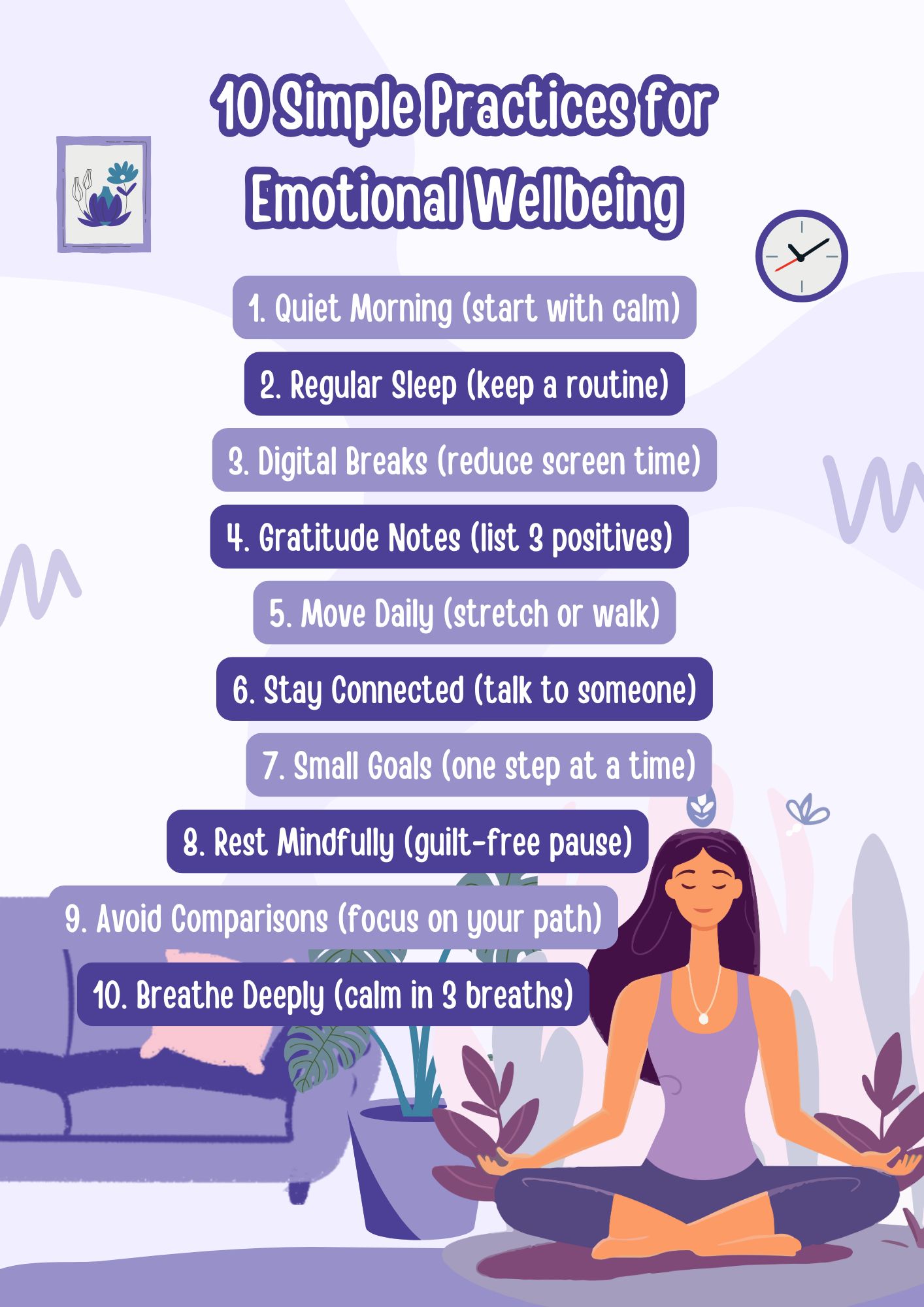10 Simple Practices to Support Emotional Wellbeing

Emotional wellbeing is an important part of living a balanced life. While everyone faces stress and uncertainty, small, consistent habits can help create a sense of stability and calm. Below are ten practical and approachable practices that anyone can incorporate into their daily routine to maintain and strengthen emotional wellbeing.
| # | Practice | Benefit |
|---|---|---|
| 1 | Morning Quiet Time | Sets a calm tone for the day |
| 2 | Consistent Sleep Schedule | Improves mood and clarity |
| 3 | Limit Digital Overload | Reduces anxiety and fatigue |
| 4 | Practice Gratitude | Shifts focus to positivity |
| 5 | Move Your Body | Boosts mood with endorphins |
1. Start the Day with a Moment of Quiet
Taking a few minutes in the morning for silence, deep breathing, or a simple mindful pause can set a calm tone for the day. It helps reduce the rush of thoughts and provides a sense of grounding before responsibilities begin.
2. Keep a Consistent Sleep Schedule
Quality sleep is directly linked to mood and emotional health. Going to bed and waking up at similar times each day helps regulate your body clock, improving mental clarity and resilience against stress.
3. Limit Digital Overload
Constant notifications and screen time can increase anxiety and fatigue. Setting boundaries—such as no screens for an hour before bed or turning off unnecessary alerts—creates space for mental rest.
4. Practice Gratitude Daily
Noticing and acknowledging positive moments, no matter how small, can shift perspective. Writing down three things you’re thankful for each day helps build an appreciation mindset that supports emotional balance.
5. Move Your Body Regularly
Physical activity, whether a short walk, stretching, or a workout, releases endorphins that naturally boost mood. Choose movements you enjoy so it feels less like a chore and more like a refreshing break.
6. Connect with Someone You Trust
Having a supportive conversation with a friend, family member, or loved one can ease feelings of isolation. Even a brief check-in can strengthen a sense of connection and understanding.
7. Set Manageable Goals
Breaking large tasks into smaller steps prevents overwhelm and creates a sense of progress. Clear, achievable goals help maintain focus and reduce feelings of frustration or stagnation.
8. Allow Yourself to Rest Without Guilt
Taking time to relax isn’t laziness—it’s a necessary reset. Reading a book, listening to music, or simply sitting in silence can help recharge emotional reserves and improve overall wellbeing.
9. Limit Comparisons
Constant comparison, especially on social media, can distort self-perception. Remind yourself that what you see online often doesn’t reflect reality, and focus on your own pace and achievements.
10. Practice Simple Breathing Exercises
When stress hits, slow, deep breathing can quickly calm the nervous system. Try inhaling for four counts, holding for two, and exhaling for six. This simple technique can bring immediate relief in tense moments.
Closing Thoughts
Supporting emotional wellbeing doesn’t require drastic changes. These simple, steady habits can help create a more balanced and calm mindset over time. The key is consistency and being patient with yourself while making small adjustments that fit your lifestyle.

Disclaimer: The articles and information provided by the Vagina Institute are for informational and educational purposes only. This content is not intended to be a substitute for professional medical advice, diagnosis, or treatment. Always seek the advice of your physician or another qualified health provider with any questions you may have regarding a medical condition.


 Deutsch
Deutsch  English
English  Español
Español  Français
Français 



